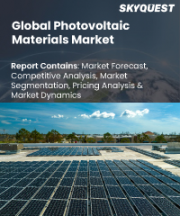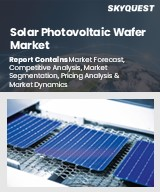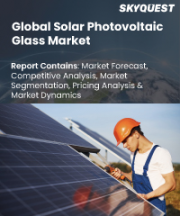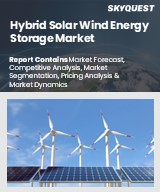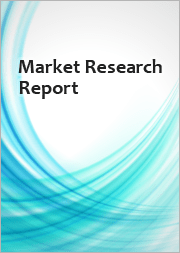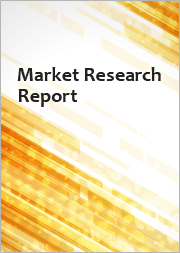
|
시장보고서
상품코드
1795364
솔라 정화기 시장Solar Purifiers |
||||||
솔라 정화기 세계 시장은 2030년까지 8억 1,960만 달러에 달할 전망
2024년에 4억 9,720만 달러로 추정되는 솔라 정화기 세계 시장은 분석 기간인 2024-2030년에 CAGR 8.7%로 성장하여 2030년에는 8억 1,960만 달러에 달할 것으로 예측됩니다. 이 보고서에서 분석한 부문 중 하나인 솔라 정수기는 CAGR 9.8%를 기록하며 분석 기간 종료시에는 6억 1,320만 달러에 달할 것으로 예측됩니다. 솔라 공기청정기 부문은 분석 기간 동안에 CAGR 5.7%의 성장이 전망됩니다.
미국 시장은 1억 3,070만 달러로 추정, 중국은 CAGR 8.3%로 성장 예측
미국의 솔라 정화기 시장은 2024년에 1억 3,070만 달러로 추정됩니다. 세계 2위 경제 대국인 중국은 2024년부터 2030년까지 CAGR 8.3%로 성장하여 2030년에는 1억 3,040만 달러의 시장 규모에 달할 것으로 예측됩니다. 기타 주목할 만한 지역별 시장으로는 일본과 캐나다가 있고, 분석 기간 동안 CAGR은 각각 8.1%와 7.2%로 예측됩니다. 유럽에서는 독일이 CAGR 약 6.8%로 성장할 것으로 예측됩니다.
세계의 솔라 정화기 시장 - 주요 동향과 촉진요인 정리
태양광으로 깨끗한 물에 대한 접근성 강화 - 솔라 정화기가 분산형 수처리를 혁신하는 방법
솔라 정화기가 분산형 수처리 솔루션으로 각광받는 이유는 무엇일까?
솔라 정화기는 전기가 공급되지 않는 지역이나 에너지가 부족한 지역에 깨끗하고 안전한 식수를 저렴하게 공급하기 위한 전 세계 노력에 있어 매우 중요한 기술로 부상하고 있습니다. 이 시스템은 태양에너지(열 또는 태양광발전)를 이용하여 증류, 자외선(UV) 소독, 여과, 고도 산화 등의 정수 공정을 구동합니다. 솔라 정화기는 풍부하고 재생 가능한 에너지원을 활용함으로써 연료와 전력망에 의존하는 처리 인프라에 대한 의존도를 없애고, 지속가능하고 분산된 식수 생산을 가능하게 합니다. 물 부족의 심각성, 수계 전염병에 대한 인식의 증가, 기후변화에 강한 물 솔루션의 시급성으로 인해 이 기술의 중요성은 점점 더 커지고 있습니다.
태양열을 이용한 정수 시스템은 크게 열을 이용하는 것과 태양광을 이용하는 것으로 나뉩니다. 열 시스템은 물을 증발 및 응축시켜 오염물질을 제거하는 태양열 스틸에 의존하고, 태양광발전 시스템은 태양광 패널에서 생산된 전력을 펌프, UV 램프 또는 역삼투막에 사용하는 시스템입니다. 이 장치는 중앙 집중식 인프라가 신뢰할 수 없거나 존재하지 않는 외딴 마을, 재난 구호 지역, 난민 캠프, 도시 주변 거주지 등에 특히 적합합니다. 또한, 운영비용이 낮고, 유지보수가 최소화되며, 지하수, 강, 호수, 호수, 기수 등 다양한 수원에서 물을 정화할 수 있어 다양한 지역과 사용자 그룹에 적합합니다.
솔라 정화기 보급을 촉진하는 응용 분야 및 사용자 부문은 무엇인가?
솔라 정화기의 보급을 주도하고 있는 분야는 농촌 및 인도적 물 공급, 소규모 농업, 학교, 의료시설, 생태관광 등 다양한 분야입니다. 중저소득 국가(LMICs)에서는 20억 명 이상의 사람들이 여전히 안전한 식수를 구할 수 없는데, 솔라 정화기는 확장 가능하고 비용 효율적인 솔루션을 제공합니다. 많은 솔라 정화기는 모듈형 PV 어레이와 중력식 여과 장치를 사용하여 하루에 수백 리터의 안전한 물을 생산할 수 있는 지역 사회 규모의 시스템으로 설계되어 있습니다.
특히 사하라 사막 이남의 아프리카와 남아시아의 의료 시설에서 태양열 물 살균기는 무균 환경을 보장하고 위생 기준을 유지하는 데 필수적입니다. 진료소나 산부인과 병동에서는 수술실, 분만실, 위생시설에서 사용되는 물의 처리에 태양열 UV 정수기를 사용하고 있습니다. 학교나 아동개발센터에서는 아이들이 하루 종일 깨끗한 식수를 확보할 수 있도록 태양열 정수 키오스크를 이용하는 사례가 늘고 있습니다. 솔라 정화기는 소규모 농가에서도 특히 수질이 오염된 지역에서 고부가가치 원예 및 유기 농업 시스템을 위한 병원균이 없는 관개용수를 확보하기 위해 사용되고 있습니다.
관광 산업, 특히 에코 리조트, 트레킹 롯지, 사파리 캠프 등에서는 생수에서 나오는 플라스틱 폐기물을 최소화하면서 지속가능성 목표에 부합하기 위해 태양열 정화 장치를 도입하고 있습니다. 또한, 원격지 조사소, 광산 전초기지, 군사 캠프에서도 물류 및 환경 효율을 위해 태양열 정화 기술이 활용되고 있습니다. 태양열 배낭형 정수기 및 휴대용 태양열 소독(SODIS) 장치는 이동성, 사용 편의성 및 위기 상황에서의 적응성으로 인해 인도주의 지원자, 등산객 및 재난 대응팀 사이에서 인기를 얻고 있습니다.
어느 지역에서 도입이 확대되고 있으며, 정책 및 자금 조달 프레임워크는 어떻게 진화하고 있는가?
남아시아, 사하라 이남 아프리카, 동남아시아는 태양열 정화기의 가장 크고 빠르게 성장하는 시장입니다. 인도, 방글라데시, 네팔, 스리랑카에서는 NGO, 유엔기구, 사회적 기업과 협력하여 태양광 기반 장치를 통합한 대규모 농촌 정수 프로그램을 시행하고 있습니다. 인도의 'Jal Jeevan Mission'과 방글라데시의 'Safe Water Supply Projects'는 오지 마을의 안전한 물 확보라는 목표를 달성하기 위해 태양광발전 기반 처리 시스템을 적극적으로 도입하고 있습니다. 아프리카에서는 케냐, 우간다, 에티오피아, 가나, 말라위 등의 국가들이 USAID, 유니세프, GIZ, 세계은행의 이니셔티브 지원을 받아 농촌 지역의 물 이용을 개선하기 위해 태양광을 이용한 수도 키오스크와 보링 시스템을 도입하고 있습니다.
라틴아메리카, 특히 볼리비아, 온두라스, 페루에서도 지역 사회가 주도하는 협동조합과 NGO가 자금을 지원하는 탄력성 프로젝트를 통해 태양열 정수가 확대되고 있습니다. 한편, 중동 및 북아프리카 지역에서는 심각한 물 부족을 해결하기 위해 요르단, 모로코, 튀니지 등의 국가에서 태양열을 이용한 해수담수화 및 정수를 시범적으로 도입하고 있습니다. 유럽과 북미에서는 오프그리드 커뮤니티, 비상사태 대비 프로그램, 국립공원이나 섬 연구시설 등 외딴 지역에서 활동하는 지속가능성을 중시하는 조직 등이 도입을 추진하고 있습니다.
정책의 틀은 태양열 온수 기술과 더욱 긴밀하게 연계되기 시작했으며, 정부는 보조금, 관세 면제, 분산형 물 시스템에 대한 성능 기반 보조금을 제공하고 있습니다. 혁신적인 자금 조달 모델(마이크로 리스, Pay-as-you-drink 키오스크, 성과 기반 자금 조달 등)을 통해 저소득층의 이용자들이 보다 폭넓게 접근할 수 있게 되었습니다. 태양광발전 기술 제공업체, 물 NGO, 지역 기업가들의 파트너십은 라스트 마일 물 분배, 유지보수 교육, 장기적인 시스템 실행 가능성을 높이는 커뮤니티 소유권 구조를 촉진하고 있습니다.
시장 확대의 원동력은 무엇이며, 기술의 발전이 새로운 성장 가능성을 가져다주는 곳은 어디일까.
수질 오염에 대한 우려 증가, 분산형 물 솔루션에 대한 수요, 저렴한 가격의 태양광 기술에 대한 접근성 확대 등 여러 요인이 세계 태양광 정화기 시장의 성장을 견인하고 있습니다. 에너지 비용이 상승하고 오염과 기후 변화로 인해 수질이 저하되는 가운데, 오프그리드 수처리의 매력은 크게 증가하고 있습니다. 태양열 정수장치는 운영비용을 절감할 뿐만 아니라, 접근이 어려운 지역이나 재난 피해 지역에서도 일관성 있는 안전한 물 공급을 실현하여 공중보건 향상에 기여합니다. 또한, 기후변화 적응과 지속가능발전목표(SDGs), 특히 SDGs 6(깨끗한 물과 위생)과 SDGs 7(저렴하고 깨끗한 에너지)의 중요성이 높아지면서 기부자와 정책당국이 솔라 정화기 보급에 관심을 기울이고 있습니다.
기술 혁신은 성장 전망을 더욱 높여주고 있습니다. 고효율 태양광 패널, 에너지 저장 솔루션, 배터리가 필요 없는 컴팩트한 디자인의 발전으로 신뢰성과 비용 효율성이 향상되었습니다. 에너지 회수 장치를 갖춘 태양열 역삼투압(RO) 시스템은 해안 지역과 사막 지역의 기수 및 염수 처리를 가능하게 합니다. 태양열 및 태양광 하이브리드 시스템은 소독을 강화하고 비소, 불소, 중금속 등 보다 광범위한 오염물질을 제거하기 위해 개발되고 있습니다. 수질과 유량을 원격으로 모니터링하는 IoT 지원 정화 장치는 투명성과 시스템 가동 시간을 개선하기 위해 공공 상수도 액세스 포인트에서 테스트되고 있습니다.
향후 성장 기회는 물 저장 탱크, 계량 분배 시스템, 모바일 결제 플랫폼과 통합된 모듈식 커뮤니티 규모의 태양광 정화 허브에 있습니다. 이러한 '물 ATM'은 도시 근교 거주지나 비공식 경제권에서 채택되고 있으며, 안전한 물 접근을 촉진하는 동시에 사업자에게는 수익원을 창출하고 있습니다. 기후 변화로 인해 선진국과 개발도상국을 막론하고 물 부족이 심화되고 있는 가운데, 태양열 정수장치는 전 세계에 분산형, 견고하고 지속가능한 청정수 솔루션을 제공함으로써 적응형 물 인프라의 필수적인 구성요소가 될 준비가 되어 있습니다.
부문
유형(솔라 정수기, 솔라 공기청정기), 용도(휴대용, 고정형)
조사 대상 기업 사례
- ActivePure Technologies
- AMPAC USA
- Applied Membranes Inc.(Solar RO/UF)
- Eliodomestico(solar still)
- F Cubed Limited(Carocell)
- GoSun Inc.(Flow Pro purifier)
- Healing Waters(Solar Pure)
- IIT-Madras Solar Desalination
- NEWater
- Oasis Montana(GenPro systems)
- Puralytics(SolarBag)
- Solar Water Solutions
- Solvatten AB
- Source Global(SOURCE Hydropanel)
- Tethys Solar Desalination(TSD)
- Wagner & Co. Solar Technology
- Wayout International
- Wyckomar UV(UV-250 purifier)
AI 통합
Global Industry Analysts는 검증된 전문가 컨텐츠와 AI 툴을 통해 시장과 경쟁 정보를 혁신하고 있습니다.
Global Industry Analysts는 일반적인 LLM 및 업계별 SLM 쿼리를 따르는 대신 비디오 기록, 블로그, 검색 엔진 조사, 방대한 양의 기업, 제품/서비스, 시장 데이터 등 세계 전문가로부터 수집한 컨텐츠 리포지토리를 구축했습니다.
관세 영향 계수
Global Industry Analysts는 본사 소재지, 제조거점, 수출입(완제품 및 OEM)을 기준으로 기업의 경쟁력 변화를 예측하고 있습니다. 이러한 복잡하고 다면적인 시장 역학은 매출원가(COGS) 증가, 수익성 하락, 공급망 재편 등 미시적, 거시적 시장 역학 중에서도 특히 경쟁사들에게 영향을 미칠 것으로 예상됩니다.
목차
제1장 조사 방법
제2장 주요 요약
- 시장 개요
- 주요 기업
- 시장 동향과 촉진요인
- 세계 시장 전망
제3장 시장 분석
- 미국
- 캐나다
- 일본
- 중국
- 유럽
- 프랑스
- 독일
- 이탈리아
- 영국
- 기타 유럽
- 아시아태평양
- 기타 지역
제4장 경쟁
KSM 25.08.28Global Solar Purifiers Market to Reach US$819.6 Million by 2030
The global market for Solar Purifiers estimated at US$497.2 Million in the year 2024, is expected to reach US$819.6 Million by 2030, growing at a CAGR of 8.7% over the analysis period 2024-2030. Solar Water Purifiers, one of the segments analyzed in the report, is expected to record a 9.8% CAGR and reach US$613.2 Million by the end of the analysis period. Growth in the Solar Air Purifiers segment is estimated at 5.7% CAGR over the analysis period.
The U.S. Market is Estimated at US$130.7 Million While China is Forecast to Grow at 8.3% CAGR
The Solar Purifiers market in the U.S. is estimated at US$130.7 Million in the year 2024. China, the world's second largest economy, is forecast to reach a projected market size of US$130.4 Million by the year 2030 trailing a CAGR of 8.3% over the analysis period 2024-2030. Among the other noteworthy geographic markets are Japan and Canada, each forecast to grow at a CAGR of 8.1% and 7.2% respectively over the analysis period. Within Europe, Germany is forecast to grow at approximately 6.8% CAGR.
Global Solar Purifiers Market - Key Trends & Drivers Summarized
Empowering Clean Water Access with Sunlight: How Solar Purifiers Are Transforming Decentralized Water Treatment
Why Are Solar Purifiers Gaining Momentum as Decentralized Water Treatment Solutions?
Solar purifiers are emerging as crucial technologies in the global effort to provide clean, safe, and affordable drinking water in both off-grid and energy-deficient regions. These systems leverage solar energy-either in the form of thermal heat or photovoltaic electricity-to drive water purification processes such as distillation, ultraviolet (UV) disinfection, filtration, or advanced oxidation. By utilizing an abundant and renewable energy source, solar purifiers eliminate the dependency on fuel-based or grid-powered treatment infrastructure, thereby enabling sustainable and decentralized potable water production. The relevance of this technology is intensifying due to increasing water scarcity, rising awareness of waterborne diseases, and the urgency of climate-resilient water solutions.
Solar-powered water purification systems can be broadly categorized into thermal-based and photovoltaic-based systems. Thermal systems rely on solar stills that evaporate and condense water to remove contaminants, while PV-based systems use electricity generated from solar panels to power pumps, UV lamps, or reverse osmosis membranes. These devices are particularly suitable for remote villages, disaster relief zones, refugee camps, and peri-urban settlements where centralized infrastructure is unreliable or non-existent. Additionally, their low operating costs, minimal maintenance requirements, and ability to purify water from various sources-such as groundwater, rivers, lakes, and brackish wells-make them ideal for a wide range of geographies and user groups.
Which Application Sectors and User Segments Are Driving the Deployment of Solar Purifiers?
The primary drivers of solar purifier adoption lie in rural and humanitarian water provisioning, small-scale agriculture, schools, healthcare facilities, and eco-tourism sectors. In low- and middle-income countries (LMICs), where over two billion people still lack access to safe drinking water, solar purifiers offer a scalable and cost-effective solution. NGOs, development agencies, and local governments are deploying solar purifiers in communities vulnerable to waterborne diseases like cholera, dysentery, and hepatitis A. Many of these units are designed as community-scale systems capable of producing hundreds of liters of safe water per day using modular PV arrays and gravity-based filtration units.
In healthcare facilities, particularly in sub-Saharan Africa and South Asia, solar water disinfection units are critical for ensuring sterile environments and maintaining hygiene standards. Clinics and maternity wards use solar UV purifiers to treat water used in surgeries, delivery rooms, and sanitation facilities. Schools and child development centers increasingly rely on solar-powered purification kiosks to ensure children have access to clean drinking water throughout the day-thereby reducing absenteeism due to waterborne illnesses. Solar purifiers are also used in smallholder agricultural settings to ensure pathogen-free irrigation water for high-value horticulture and organic farming systems, especially in regions with contaminated water tables.
The tourism industry-especially eco-resorts, trekking lodges, and safari camps-is deploying solar purifiers to align with sustainability goals while minimizing plastic waste from bottled water. Remote research stations, mining outposts, and military camps also utilize solar purification technologies for logistical and environmental efficiency. Solar backpack purifiers and portable solar disinfection (SODIS) units have gained popularity among humanitarian responders, hikers, and disaster response teams due to their mobility, ease of use, and adaptability in crisis situations.
Which Regions Are Scaling Adoption and How Are Policy and Financing Frameworks Evolving?
South Asia, sub-Saharan Africa, and Southeast Asia are the largest and fastest-growing markets for solar purifiers. India, Bangladesh, Nepal, and Sri Lanka are implementing large-scale rural water purification programs incorporating solar-based units, often in collaboration with NGOs, UN agencies, and social enterprises. India's Jal Jeevan Mission and Bangladesh-s Safe Water Supply Projects are actively incorporating solar PV-based treatment systems to meet safe water targets in remote villages. In Africa, countries such as Kenya, Uganda, Ethiopia, Ghana, and Malawi are deploying solar water kiosks and solar-powered borehole systems to improve rural water access, supported by initiatives from USAID, UNICEF, GIZ, and the World Bank.
Latin America, particularly Bolivia, Honduras, and Peru, is also expanding solar water purification through community-led cooperatives and NGO-funded resilience projects. Meanwhile, the Middle East and North Africa region is piloting solar desalination and purification in countries like Jordan, Morocco, and Tunisia to address severe water stress. In Europe and North America, adoption is driven by off-grid communities, emergency preparedness programs, and sustainability-conscious organizations operating in remote areas such as national parks or island research stations.
Policy frameworks are beginning to align more closely with solar water technologies, with governments offering grants, customs duty exemptions, and performance-based subsidies for decentralized water systems. Innovative financing models-such as micro-leasing, pay-as-you-drink kiosks, and results-based financing-are enabling wider access among low-income users. Partnerships between solar technology providers, water NGOs, and local entrepreneurs are fostering last-mile distribution, maintenance training, and community ownership structures that enhance long-term system viability.
What Is Fueling Market Expansion and Where Do Technological Advancements Offer New Growth Potential?
The growth in the global solar purifiers market is driven by several factors including rising concerns about water contamination, demand for decentralized water solutions, and expanding access to affordable solar technologies. As energy costs rise and water quality declines due to pollution and climate variability, the appeal of off-grid water treatment has increased substantially. Solar purifiers not only reduce operational costs but also support public health outcomes by delivering consistent, safe water supply in hard-to-reach or disaster-affected areas. Additionally, the rising emphasis on climate adaptation and Sustainable Development Goals (SDGs), particularly SDG 6 (Clean Water and Sanitation) and SDG 7 (Affordable and Clean Energy), is aligning donor and policy interest with solar purifier deployment.
Technological innovations are further amplifying growth prospects. Advances in high-efficiency solar panels, energy storage solutions, and compact battery-free designs are improving reliability and cost-efficiency. Solar reverse osmosis (RO) systems with energy recovery devices are enabling brackish and saline water treatment in coastal and desert regions. Hybrid solar-thermal and solar-PV systems are being developed to enhance disinfection and remove broader contaminant classes such as arsenic, fluoride, and heavy metals. IoT-enabled purifiers that monitor water quality and flow rates remotely are being tested in public water access points to improve transparency and system uptime.
Future growth opportunities lie in modular, community-scale solar purification hubs integrated with storage tanks, metered dispensing systems, and mobile payment platforms. These “water ATMs” are being adopted in peri-urban settlements and informal economies, generating revenue streams for operators while promoting safe water access. As climate change intensifies water insecurity across both developed and developing nations, solar purifiers are poised to become an indispensable component of adaptive water infrastructure, providing decentralized, resilient, and sustainable clean water solutions worldwide.
SCOPE OF STUDY:
The report analyzes the Solar Purifiers market in terms of units by the following Segments, and Geographic Regions/Countries:
Segments:
Type (Solar Water Purifiers, Solar Air Purifiers); Application (Portable Application, Stationary Application)
Geographic Regions/Countries:
World; United States; Canada; Japan; China; Europe (France; Germany; Italy; United Kingdom; and Rest of Europe); Asia-Pacific; Rest of World.
Select Competitors (Total 34 Featured) -
- ActivePure Technologies
- AMPAC USA
- Applied Membranes Inc. (Solar RO/UF)
- Eliodomestico (solar still)
- F Cubed Limited (Carocell)
- GoSun Inc. (Flow Pro purifier)
- Healing Waters (Solar Pure)
- IIT-Madras Solar Desalination
- NEWater
- Oasis Montana (GenPro systems)
- Puralytics (SolarBag)
- Solar Water Solutions
- Solvatten AB
- Source Global (SOURCE Hydropanel)
- Tethys Solar Desalination (TSD)
- Wagner & Co. Solar Technology
- Wayout International
- Wyckomar UV (UV-250 purifier)
AI INTEGRATIONS
We're transforming market and competitive intelligence with validated expert content and AI tools.
Instead of following the general norm of querying LLMs and Industry-specific SLMs, we built repositories of content curated from domain experts worldwide including video transcripts, blogs, search engines research, and massive amounts of enterprise, product/service, and market data.
TARIFF IMPACT FACTOR
Our new release incorporates impact of tariffs on geographical markets as we predict a shift in competitiveness of companies based on HQ country, manufacturing base, exports and imports (finished goods and OEM). This intricate and multifaceted market reality will impact competitors by increasing the Cost of Goods Sold (COGS), reducing profitability, reconfiguring supply chains, amongst other micro and macro market dynamics.
TABLE OF CONTENTS
I. METHODOLOGY
II. EXECUTIVE SUMMARY
- 1. MARKET OVERVIEW
- Influencer Market Insights
- World Market Trajectories
- Tariff Impact on Global Supply Chain Patterns
- Solar Purifiers - Global Key Competitors Percentage Market Share in 2025 (E)
- Competitive Market Presence - Strong/Active/Niche/Trivial for Players Worldwide in 2025 (E)
- 2. FOCUS ON SELECT PLAYERS
- 3. MARKET TRENDS & DRIVERS
- Rising Demand for Decentralized Water Purification Solutions Drives Solar Purifier Adoption
- Application in Rural, Off-Grid, and Disaster-Prone Areas Enhances Social Impact
- Integration of UV and Thermal Purification Methods Supports Product Diversity
- Support From Public Health Initiatives Strengthens Market Penetration
- Innovation in Solar Thermal Desalination Systems Expands Scope in Water-Stressed Regions
- NGO and CSR Procurement Programs Accelerate Access in Developing Economies
- Push for Clean Drinking Water in Schools and Clinics Spurs Installations
- Growth in Mobile and Portable Solar Purifiers Promotes Usage in Outdoor and Emergency Settings
- Emphasis on Zero-Energy and Chemical-Free Purification Encourages Adoption
- Advancement in Nanomaterial-Based Filtration Enhances Contaminant Removal Efficiency
- Supportive Water Safety Regulations in Low-Infrastructure Regions Drives Demand
- Integration With Rainwater Harvesting and Greywater Recycling Systems Promotes Circular Use
- Emergence of Hybrid Solar-Electric Purification Units Supports Continuous Operation
- Rising Focus on Public Hygiene and Sanitation Boosts Demand in Community Projects
- Partnerships With Local Water Authorities Facilitate Scale-Up and Distribution
- Digital Monitoring Tools and Maintenance Alerts Enhance Reliability and Safety
- Increased Involvement of Impact Investors Encourages Product Innovation and Outreach
- Adoption in Ecotourism, Military, and Remote Work Camps Diversifies End-User Segments
- Expansion of Solar-Water Startups Across Asia and Africa Drives Market Momentum
- Government Endorsements of Sustainable WASH (Water, Sanitation, and Hygiene) Technologies Expand Reach
- 4. GLOBAL MARKET PERSPECTIVE
- TABLE 1: World Solar Purifiers Market Analysis of Annual Sales in US$ Thousand for Years 2014 through 2030
- TABLE 2: World Recent Past, Current & Future Analysis for Solar Purifiers by Geographic Region - USA, Canada, Japan, China, Europe, Asia-Pacific and Rest of World Markets - Independent Analysis of Annual Sales in US$ Thousand for Years 2024 through 2030 and % CAGR
- TABLE 3: World 6-Year Perspective for Solar Purifiers by Geographic Region - Percentage Breakdown of Value Sales for USA, Canada, Japan, China, Europe, Asia-Pacific and Rest of World Markets for Years 2025 & 2030
- TABLE 4: World Recent Past, Current & Future Analysis for Solar Water Purifiers by Geographic Region - USA, Canada, Japan, China, Europe, Asia-Pacific and Rest of World Markets - Independent Analysis of Annual Sales in US$ Thousand for Years 2024 through 2030 and % CAGR
- TABLE 5: World 6-Year Perspective for Solar Water Purifiers by Geographic Region - Percentage Breakdown of Value Sales for USA, Canada, Japan, China, Europe, Asia-Pacific and Rest of World for Years 2025 & 2030
- TABLE 6: World Recent Past, Current & Future Analysis for Solar Air Purifiers by Geographic Region - USA, Canada, Japan, China, Europe, Asia-Pacific and Rest of World Markets - Independent Analysis of Annual Sales in US$ Thousand for Years 2024 through 2030 and % CAGR
- TABLE 7: World 6-Year Perspective for Solar Air Purifiers by Geographic Region - Percentage Breakdown of Value Sales for USA, Canada, Japan, China, Europe, Asia-Pacific and Rest of World for Years 2025 & 2030
- TABLE 8: World Recent Past, Current & Future Analysis for Portable Application by Geographic Region - USA, Canada, Japan, China, Europe, Asia-Pacific and Rest of World Markets - Independent Analysis of Annual Sales in US$ Thousand for Years 2024 through 2030 and % CAGR
- TABLE 9: World 6-Year Perspective for Portable Application by Geographic Region - Percentage Breakdown of Value Sales for USA, Canada, Japan, China, Europe, Asia-Pacific and Rest of World for Years 2025 & 2030
- TABLE 10: World Recent Past, Current & Future Analysis for Stationary Application by Geographic Region - USA, Canada, Japan, China, Europe, Asia-Pacific and Rest of World Markets - Independent Analysis of Annual Sales in US$ Thousand for Years 2024 through 2030 and % CAGR
- TABLE 11: World 6-Year Perspective for Stationary Application by Geographic Region - Percentage Breakdown of Value Sales for USA, Canada, Japan, China, Europe, Asia-Pacific and Rest of World for Years 2025 & 2030
III. MARKET ANALYSIS
- UNITED STATES
- Solar Purifiers Market Presence - Strong/Active/Niche/Trivial - Key Competitors in the United States for 2025 (E)
- TABLE 12: USA Recent Past, Current & Future Analysis for Solar Purifiers by Type - Solar Water Purifiers and Solar Air Purifiers - Independent Analysis of Annual Sales in US$ Thousand for the Years 2024 through 2030 and % CAGR
- TABLE 13: USA 6-Year Perspective for Solar Purifiers by Type - Percentage Breakdown of Value Sales for Solar Water Purifiers and Solar Air Purifiers for the Years 2025 & 2030
- TABLE 14: USA Recent Past, Current & Future Analysis for Solar Purifiers by Application - Portable Application and Stationary Application - Independent Analysis of Annual Sales in US$ Thousand for the Years 2024 through 2030 and % CAGR
- TABLE 15: USA 6-Year Perspective for Solar Purifiers by Application - Percentage Breakdown of Value Sales for Portable Application and Stationary Application for the Years 2025 & 2030
- CANADA
- TABLE 16: Canada Recent Past, Current & Future Analysis for Solar Purifiers by Type - Solar Water Purifiers and Solar Air Purifiers - Independent Analysis of Annual Sales in US$ Thousand for the Years 2024 through 2030 and % CAGR
- TABLE 17: Canada 6-Year Perspective for Solar Purifiers by Type - Percentage Breakdown of Value Sales for Solar Water Purifiers and Solar Air Purifiers for the Years 2025 & 2030
- TABLE 18: Canada Recent Past, Current & Future Analysis for Solar Purifiers by Application - Portable Application and Stationary Application - Independent Analysis of Annual Sales in US$ Thousand for the Years 2024 through 2030 and % CAGR
- TABLE 19: Canada 6-Year Perspective for Solar Purifiers by Application - Percentage Breakdown of Value Sales for Portable Application and Stationary Application for the Years 2025 & 2030
- JAPAN
- Solar Purifiers Market Presence - Strong/Active/Niche/Trivial - Key Competitors in Japan for 2025 (E)
- TABLE 20: Japan Recent Past, Current & Future Analysis for Solar Purifiers by Type - Solar Water Purifiers and Solar Air Purifiers - Independent Analysis of Annual Sales in US$ Thousand for the Years 2024 through 2030 and % CAGR
- TABLE 21: Japan 6-Year Perspective for Solar Purifiers by Type - Percentage Breakdown of Value Sales for Solar Water Purifiers and Solar Air Purifiers for the Years 2025 & 2030
- TABLE 22: Japan Recent Past, Current & Future Analysis for Solar Purifiers by Application - Portable Application and Stationary Application - Independent Analysis of Annual Sales in US$ Thousand for the Years 2024 through 2030 and % CAGR
- TABLE 23: Japan 6-Year Perspective for Solar Purifiers by Application - Percentage Breakdown of Value Sales for Portable Application and Stationary Application for the Years 2025 & 2030
- CHINA
- Solar Purifiers Market Presence - Strong/Active/Niche/Trivial - Key Competitors in China for 2025 (E)
- TABLE 24: China Recent Past, Current & Future Analysis for Solar Purifiers by Type - Solar Water Purifiers and Solar Air Purifiers - Independent Analysis of Annual Sales in US$ Thousand for the Years 2024 through 2030 and % CAGR
- TABLE 25: China 6-Year Perspective for Solar Purifiers by Type - Percentage Breakdown of Value Sales for Solar Water Purifiers and Solar Air Purifiers for the Years 2025 & 2030
- TABLE 26: China Recent Past, Current & Future Analysis for Solar Purifiers by Application - Portable Application and Stationary Application - Independent Analysis of Annual Sales in US$ Thousand for the Years 2024 through 2030 and % CAGR
- TABLE 27: China 6-Year Perspective for Solar Purifiers by Application - Percentage Breakdown of Value Sales for Portable Application and Stationary Application for the Years 2025 & 2030
- EUROPE
- Solar Purifiers Market Presence - Strong/Active/Niche/Trivial - Key Competitors in Europe for 2025 (E)
- TABLE 28: Europe Recent Past, Current & Future Analysis for Solar Purifiers by Geographic Region - France, Germany, Italy, UK and Rest of Europe Markets - Independent Analysis of Annual Sales in US$ Thousand for Years 2024 through 2030 and % CAGR
- TABLE 29: Europe 6-Year Perspective for Solar Purifiers by Geographic Region - Percentage Breakdown of Value Sales for France, Germany, Italy, UK and Rest of Europe Markets for Years 2025 & 2030
- TABLE 30: Europe Recent Past, Current & Future Analysis for Solar Purifiers by Type - Solar Water Purifiers and Solar Air Purifiers - Independent Analysis of Annual Sales in US$ Thousand for the Years 2024 through 2030 and % CAGR
- TABLE 31: Europe 6-Year Perspective for Solar Purifiers by Type - Percentage Breakdown of Value Sales for Solar Water Purifiers and Solar Air Purifiers for the Years 2025 & 2030
- TABLE 32: Europe Recent Past, Current & Future Analysis for Solar Purifiers by Application - Portable Application and Stationary Application - Independent Analysis of Annual Sales in US$ Thousand for the Years 2024 through 2030 and % CAGR
- TABLE 33: Europe 6-Year Perspective for Solar Purifiers by Application - Percentage Breakdown of Value Sales for Portable Application and Stationary Application for the Years 2025 & 2030
- FRANCE
- Solar Purifiers Market Presence - Strong/Active/Niche/Trivial - Key Competitors in France for 2025 (E)
- TABLE 34: France Recent Past, Current & Future Analysis for Solar Purifiers by Type - Solar Water Purifiers and Solar Air Purifiers - Independent Analysis of Annual Sales in US$ Thousand for the Years 2024 through 2030 and % CAGR
- TABLE 35: France 6-Year Perspective for Solar Purifiers by Type - Percentage Breakdown of Value Sales for Solar Water Purifiers and Solar Air Purifiers for the Years 2025 & 2030
- TABLE 36: France Recent Past, Current & Future Analysis for Solar Purifiers by Application - Portable Application and Stationary Application - Independent Analysis of Annual Sales in US$ Thousand for the Years 2024 through 2030 and % CAGR
- TABLE 37: France 6-Year Perspective for Solar Purifiers by Application - Percentage Breakdown of Value Sales for Portable Application and Stationary Application for the Years 2025 & 2030
- GERMANY
- Solar Purifiers Market Presence - Strong/Active/Niche/Trivial - Key Competitors in Germany for 2025 (E)
- TABLE 38: Germany Recent Past, Current & Future Analysis for Solar Purifiers by Type - Solar Water Purifiers and Solar Air Purifiers - Independent Analysis of Annual Sales in US$ Thousand for the Years 2024 through 2030 and % CAGR
- TABLE 39: Germany 6-Year Perspective for Solar Purifiers by Type - Percentage Breakdown of Value Sales for Solar Water Purifiers and Solar Air Purifiers for the Years 2025 & 2030
- TABLE 40: Germany Recent Past, Current & Future Analysis for Solar Purifiers by Application - Portable Application and Stationary Application - Independent Analysis of Annual Sales in US$ Thousand for the Years 2024 through 2030 and % CAGR
- TABLE 41: Germany 6-Year Perspective for Solar Purifiers by Application - Percentage Breakdown of Value Sales for Portable Application and Stationary Application for the Years 2025 & 2030
- ITALY
- TABLE 42: Italy Recent Past, Current & Future Analysis for Solar Purifiers by Type - Solar Water Purifiers and Solar Air Purifiers - Independent Analysis of Annual Sales in US$ Thousand for the Years 2024 through 2030 and % CAGR
- TABLE 43: Italy 6-Year Perspective for Solar Purifiers by Type - Percentage Breakdown of Value Sales for Solar Water Purifiers and Solar Air Purifiers for the Years 2025 & 2030
- TABLE 44: Italy Recent Past, Current & Future Analysis for Solar Purifiers by Application - Portable Application and Stationary Application - Independent Analysis of Annual Sales in US$ Thousand for the Years 2024 through 2030 and % CAGR
- TABLE 45: Italy 6-Year Perspective for Solar Purifiers by Application - Percentage Breakdown of Value Sales for Portable Application and Stationary Application for the Years 2025 & 2030
- UNITED KINGDOM
- Solar Purifiers Market Presence - Strong/Active/Niche/Trivial - Key Competitors in the United Kingdom for 2025 (E)
- TABLE 46: UK Recent Past, Current & Future Analysis for Solar Purifiers by Type - Solar Water Purifiers and Solar Air Purifiers - Independent Analysis of Annual Sales in US$ Thousand for the Years 2024 through 2030 and % CAGR
- TABLE 47: UK 6-Year Perspective for Solar Purifiers by Type - Percentage Breakdown of Value Sales for Solar Water Purifiers and Solar Air Purifiers for the Years 2025 & 2030
- TABLE 48: UK Recent Past, Current & Future Analysis for Solar Purifiers by Application - Portable Application and Stationary Application - Independent Analysis of Annual Sales in US$ Thousand for the Years 2024 through 2030 and % CAGR
- TABLE 49: UK 6-Year Perspective for Solar Purifiers by Application - Percentage Breakdown of Value Sales for Portable Application and Stationary Application for the Years 2025 & 2030
- REST OF EUROPE
- TABLE 50: Rest of Europe Recent Past, Current & Future Analysis for Solar Purifiers by Type - Solar Water Purifiers and Solar Air Purifiers - Independent Analysis of Annual Sales in US$ Thousand for the Years 2024 through 2030 and % CAGR
- TABLE 51: Rest of Europe 6-Year Perspective for Solar Purifiers by Type - Percentage Breakdown of Value Sales for Solar Water Purifiers and Solar Air Purifiers for the Years 2025 & 2030
- TABLE 52: Rest of Europe Recent Past, Current & Future Analysis for Solar Purifiers by Application - Portable Application and Stationary Application - Independent Analysis of Annual Sales in US$ Thousand for the Years 2024 through 2030 and % CAGR
- TABLE 53: Rest of Europe 6-Year Perspective for Solar Purifiers by Application - Percentage Breakdown of Value Sales for Portable Application and Stationary Application for the Years 2025 & 2030
- ASIA-PACIFIC
- Solar Purifiers Market Presence - Strong/Active/Niche/Trivial - Key Competitors in Asia-Pacific for 2025 (E)
- TABLE 54: Asia-Pacific Recent Past, Current & Future Analysis for Solar Purifiers by Type - Solar Water Purifiers and Solar Air Purifiers - Independent Analysis of Annual Sales in US$ Thousand for the Years 2024 through 2030 and % CAGR
- TABLE 55: Asia-Pacific 6-Year Perspective for Solar Purifiers by Type - Percentage Breakdown of Value Sales for Solar Water Purifiers and Solar Air Purifiers for the Years 2025 & 2030
- TABLE 56: Asia-Pacific Recent Past, Current & Future Analysis for Solar Purifiers by Application - Portable Application and Stationary Application - Independent Analysis of Annual Sales in US$ Thousand for the Years 2024 through 2030 and % CAGR
- TABLE 57: Asia-Pacific 6-Year Perspective for Solar Purifiers by Application - Percentage Breakdown of Value Sales for Portable Application and Stationary Application for the Years 2025 & 2030
- REST OF WORLD
- TABLE 58: Rest of World Recent Past, Current & Future Analysis for Solar Purifiers by Type - Solar Water Purifiers and Solar Air Purifiers - Independent Analysis of Annual Sales in US$ Thousand for the Years 2024 through 2030 and % CAGR
- TABLE 59: Rest of World 6-Year Perspective for Solar Purifiers by Type - Percentage Breakdown of Value Sales for Solar Water Purifiers and Solar Air Purifiers for the Years 2025 & 2030
- TABLE 60: Rest of World Recent Past, Current & Future Analysis for Solar Purifiers by Application - Portable Application and Stationary Application - Independent Analysis of Annual Sales in US$ Thousand for the Years 2024 through 2030 and % CAGR
- TABLE 61: Rest of World 6-Year Perspective for Solar Purifiers by Application - Percentage Breakdown of Value Sales for Portable Application and Stationary Application for the Years 2025 & 2030






